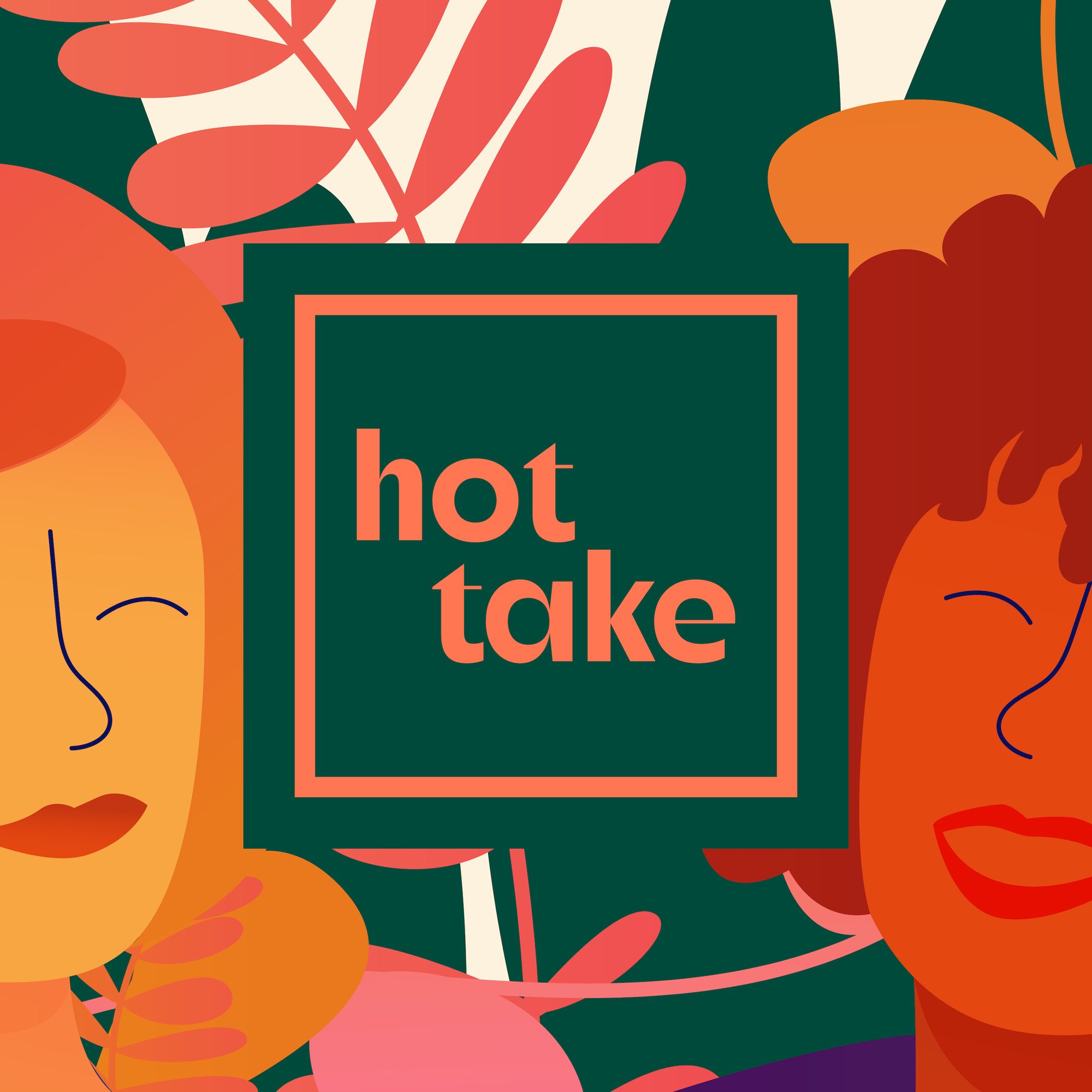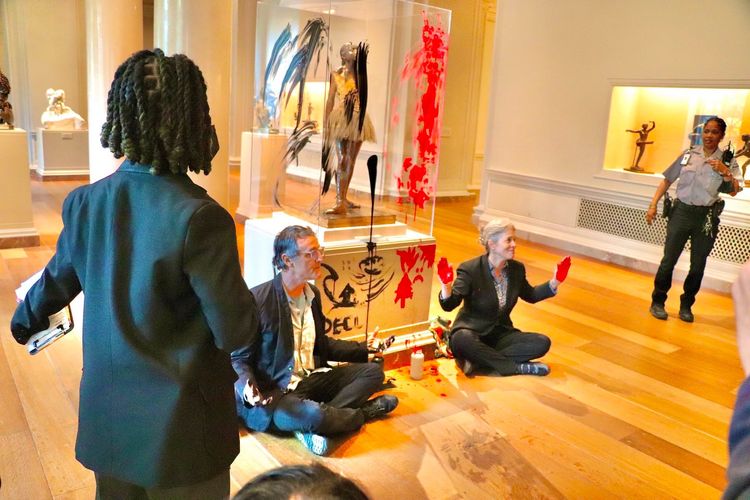On Joe Rogan, Podcasting and Disinformation
On Joe Rogan, Podcasting and Disinformation
By Amy Westervelt
Back in 2016, I started a podcasting company, Critical Frequency. I started for a few reasons. For one, I could see the podcast industry consolidating in the same way other media had and I wanted to hold ground for independent producers as best I could. For another, the industry was really dominated by producers who came from the exact same background (in a nutshell, mid-40s white guys who used to work at NPR) and I wanted to support other voices.For yet another reason, I had pitched my investigative, narrative podcast Drilled to a few big companies and was told there was no audience for narrative climate shows. I also wanted to focus on rigorous reporting and storytelling, not either/or. n the years since, I’ve seen podcasts getting on the highway to Facebook-style disinformation, and it is a huge problem.
This past week, social media was filled with various takes on Joe Rogan, whose podcast had once again been spreading disinformation. This time, it was by way of a “doctor” who doesn’t actually have a medical license, spewing unfounded garbage about Covid. Neil Young pulled his music from Spotify, other artists and podcasters followed suit, the Gimlet science podcast Science Vs committed to only making episodes that fact-check Rogan until its parent company Spotify does something, and lots of individual listeners began canceling their Spotify subscriptions. Suddenly everyone wants to talk about disinformation in podcasts. And to that I say: thank goodness because I’ve been over here shouting into the void for years.
I have some thoughts:
- Joe Rogan is a repeat offender. A couple years ago, he helped fan the flames of a rumor that anti-logging environmentalists had started the West Coast fires. The week before this COVID fiasco, Rogan had King of the Lost Boys Jordan Peterson on to share a load of utter nonsense about climate change (Peterson is not a climate scientist, nor has he ever researched any aspect of climate). If you’re going to call him out on the COVID quack, please check out the dude’s back catalog. He’s been spreading lies for years.
- His ignorance isn’t just in the scientific realm. On top of being a major spreader of various types of disinformation, Rogan is flat-out racist. He’s had “Proud Boys” leader Gavin McInness on to discuss how inherently inferior Southeast Asian people are, and apparently he lets the n-word fly with reckless abandon. This weekend, Spotify quietly removed 70 (?!) episodes in which Rogan had used racist slurs. Episodes in which he’s been hateful toward women and LGBTQ folks are still live, as are the many episodes in which he’s spread disinformation.
- It’s not just about Joe Rogan. There are loads of podcasts spewing Rogan-style disinfo and even worse every day. And then, in some ways even more troubling, there are a lot of people who do not identify as contrarians, who are not enamored of conspiracy theories, but who are peddling disinformation in their shows by accident–they’re just not checking the facts before they share them. No one is. Limiting this conversation to one producer and one platform ignores the fact that it’s an industry-wide problem. And while de-platforming can absolutely work (see: Milo Yiannopoulos), I’m not sure it would in this case. Rogan had a massive audience before Spotify. If anything, putting him behind a paywall probably limits his audience.
- The podcast industry needs to grow up. The podcast industry has been through a couple of boom and bust cycles over the past 30 years. This most recent version has brought an explosion of shows and profits—in 2015, there were around 200,000 shows listed in Apple Podcasts, today there are around 2 million, and the industry’s revenue grew from about $100 million in 2015 to close to $850 million in 2020. Here’s the thing: If you’re going to “professionalize” on the business side, you’ve got to do it on the editorial side too, folks. That means both platforms like Spotify, Apple, Stitcher, etc, and producers and production companies. If my scrappy little outfit can put a fact-checker on every show, any of these other companies can absolutely figure that out. I would love to see the industry come together and set some standards, in general. Right now Spotify is talking about labeling all Covid content. But what about climate? Or chemicals? Or, hell, history? The podcast industry should look at what’s happened to Facebook as it’s become the face of disinfo and take fucking heed.
- Paging the FCC. Because they’re not put out on publicly owned broadcast lines, podcasts are not governed by the same rules as radio. They’re not under the auspices of the Federal Communications Commission–which is why you can get away with certain things in podcasts that you can’t on radio, cursing for example. The only content that’s regulated at all in podcasts is ads and even then…not really. That job falls to the Federal Trade Commission, which really only looks into things if enough people lodge complaints (this is why you’ll hear Exxon making bold-ass claims about carbon capture on podcasts but never in a radio or TV ad). Pulling pods under the FCC’s guidance wouldn’t totally fix the problem, but it would provide some amount of active oversight of both ads and content, neither of which is provided by the FTC.
- Why is anyone listening to the Fear Factor guy? Whyyyy is anyone looking to Joe Rogan for information in the first place? America invented disinformation more than 100 years ago and it’s gotten steadily worse ever since. This country has what I’ve been calling an “information pollution” problem, and given all the book-banning news of late, it’s only getting worse. At a minimum, we need to be teaching people how to think critically. And there are actually folks trying to do that. One method I’ve found useful if you’re talking to a misinformed family member is just to gently question where their information comes from and encourage them to question it. There’s this bizarre thing happening right now where people are justifiably skeptical of information they’re hearing but after more than a century of being manipulated by companies, industries, and politicians, it’s hard for some folks to know where to aim that skepticism; helping them point in the right direction can help.
- We need to talk about free speech. This is a whole other essay, but the issue of free speech has been massively warped in this country. On the one hand, you’ve got people saying Rogan should be able to say whatever he thinks (even when it’s baseless conjecture being presented as evidence), on the other, lotta people in the same demo are down with banning books. Hmm. Freedom for me, but not for thee? Surely there’s got to be some way to curb disinformation without it becoming large-scale censorship; and frankly the fact that we can’t even have that conversation feels pretty censorship-y!
WTF HBO?
By Mary Annaïse Heglar
If I’ve learned anything from Twitter over the past few weeks, it’s that a lot of us are hate-watching the Sex and the City reboot, And Just Like That and a lot of the same people are horror-watching Euphoria. The two shows really couldn’t be more different. One is about a crew of fifty-something white ladies in New York City literally choking on their own privilege. The other is about a bunch of teenagers in suburbia (I think California?) trying their damndest to come of age in a world where they can’t trust anything or anyone. And therein lies the thing these two shows have in common: they’re both about an unstable world, one shaken by 9/11 and racial unreckonings. It’s a world in which we question gender roles AND gender assignments, and in which the #MeToo movement has upended powerful men, but body standards have become even more unattainable. These shows are grappling with a lot… but somehow… not with climate change??
Subscribe now to keep reading!
Big Oil Invented Woke-washing
By Amy Westervelt
The term “woke-washing” burst into the public consciousness in 2019, on the heels of Gillette’s #MeToo commercial. In a 2020 paper on the various tactics oil companies and their allies use to delay action on climate, social scientists pointed to it, too. There are a few ways this shows up in climate: Oil companies using diversity programs to distract from other activities; the fossil fuel industry hammering on the message that moving away from fossil fuels will be detrimental to the poor and otherwise marginalized; oil companies working with or donating heavily to civil rights groups that then carry water for them. Or, Chevron calling on the Trump administration to honor democracy in the wake of the January 6 insurrection. This is all while continuing to build refineries and pipelines in areas that disproportionately impact the poor and people of color; funding the police all over the world; crushing resistance to oil colonialism in countries in the Global South (Ecuador, Nigeria, and many more). This week I was at a library in Texas digging through some oil company archives (cause that’s what I like to do with my vacation time) and found examples of this going all the way back to the 1970s. Subscribe now to see some highlights.
Subscribe to Damages, Dammit
By Mary Annaïse Heglar
We mentioned in an earlier newsletter that Amy has yet another new podcast coming to the airwaves. It’s called Damages and it launches on February 17. The podcast follows two of Amy’s many obsessions: climate change and the courts. Each episode follows one of the hundreds of court cases prosecuting climate villains, exploring “the quest for justice and a crime against humanity: the climate crisis.” I got to listen to the first episode and let me tell you: She’s done it again.
This episode explores the rights of nature as told through the Ojibwe’s fight to protect the rights of wild rice in Minnesota. It’s a complicated story, but here’s the big takeaways: wild rice is an indicator species, meaning if it’s not doing well, the whole ecosystem isn’t doing well. Wild rice needs clean water, which means that pipelines like Line 3 and Dakota Access Pipeline (DAPL) are existential threats. And the rights of wild rice were explicit parts of treaties with the Ojibwe all the way back in the 1800s.
Those aren’t spoilers. Those are primers. Make sure you’re signed up for one hell of a ride on February 17.
Subscribe now to support our work!
Digest
Your weekly round-up of climate coverage.
Rising Temperatures, Rising Tides
4 Climate Issues New York City Will Face by Anne Barnard for The New York Times
Increasing snowstorms in Northeast US linked to climate change - The Washington Post, by Jacob Feuerstein
Fires in Colombia’s Amazon spark alarm over deforestation, by Oliver Griffin for Reuters
Great Barrier Reef on verge of another mass bleaching after highest temperatures on record by Graham Readfearn for Grist
Landslide and floods in Quito, Ecuador, kill 24 after record rainfall - The Washington Post, by Ellen Francis
‘Reduced Risk’ Pesticides Are Widespread in California Streams, by Liza Gross for InsideClimate News
Storm Batsirai set to displace 150,000 in Madagascar, aid agencies say | Reuters, by Emma Farge
US flooding losses from climate change will spike 26% by 2050, researchers say - The Washington Post, by Aaron Gregg
Climate change is altering the smell of snow - The Washington Post, by Dawn Fallik
One Year Later: The Texas Freeze Revealed a Fragile Energy System and Inspired Lasting Misinformation - Inside Climate News, by Dan Gearino
Antarctica’s ‘Doomsday Glacier’ keeps scientists at bay with iceberg and sea ice by the AP in the Guardian
Are ills of the Arctic hitting California? Hundreds of seabirds wash ashore, by Samantha Rust for the Los Angeles Times
Eerie 'Blood Snow' Is Likely Synced Up With Climate Change, Scientists Say, by Becky Ferreira for Vice
As planet warms, air conditioning could exceed power supply - Los Angeles Times, by Alex Wigglesworth and Ruben Vives
Extreme Heat is the 'New Normal' in Earth's Oceans, Study Warns, by Becky Ferreira for Vice
Warming Ocean Leaves No Safe Havens for Coral Reefs, by Bob Berwyn for InsideClimate News
Beavers Are Flooding the Warming Alaskan Arctic, Threatening Fish, Water and Indigenous Traditions - Inside Climate News, by David Hasemyer
Extreme heat in oceans 'passed point of no return' in 2014 by Damian Carrington for the Guardian
The Climate Presidency
This senator thought he had given his last speech on climate change. He was wrong. by Shannon Osaka for Grist
EPA affirms its right to limit mercury from power plants, as part of Biden's broader push to curb climate pollution - The Washington Post, by Dino Grandoni
Will climate action this year matter in the midterms? By Timothy Cama, Nick Sobczyk for E&E News
EPA objects to USPS mail truck contract, citing climate damage - The Washington Post, by Anna Phillips and Jacob Bogage
Snowstorms trap displaced Syrians between frost and dangerous fires, by Sarah Dadouch
Fed nominee hits back at GOP climate attacks. Will it work? By Avery Ellfeldt for E&E News
How states could topple Biden's Justice40 goals, by Jean Chemnick for E&E News
Leading climate group endorses six Democrats running for Senate, by Maxine Joselow and Vanessa Montalbano for The Washington Post
Sen. Shelley Moore Capito is a key Republican to watch on environmental issues - The Washington Post, by Maxine Joselow and Vanessa Montalbano
Climate Accountability
Exxon "Cares" by Molly Taft for Earther
SoCalGas faces $10-million fine for fighting climate action - Los Angeles Times, by Sammy Roth
Overwhelmed by Solar Projects, the Nation's Largest Grid Operator Seeks a Two-Year Pause on Approvals - Inside Climate News, by James Bruggers
How to Be a Better Environmentalist, by Yessenia Fumes for Atmos
Cracking down on methane ‘ultra emitters’ is a quick way to combat climate change, researchers find by Brady Dennis for The Washington Post
Photos show ‘shocking’ mass of dead fish floating off the French coast after trawler spill, by Ellen Francis for The Washington Post
Jordan Peterson and Joe Rogan Talking About Climate Change Will Make Your Brain Dissolve by Molly Taft for Earther
EU plans to include natural gas and nuclear in green energy taxonomy - The Washington Post, by Emily Rauhala
Oil jobs pay way more than clean energy jobs. That's a problem. By Neel Dhanesha for Vox
This is how much meat and dairy hurt the climate By Kenny Torrella for Vox
Why Are Fossil Fuel Firms and Senate Republicans So Afraid of Sarah Bloom Raskin? by Kate Aronoff for the New Republic
'Obsessed with optics': How the UAE plans to get to net zero | Grist by Naveena Sadasivam for Grist
Major study documents methane 'ultra-emitters' by Carlos Anchondo
BlackRock tallied its climate impact. Here's what it found By Avery Ellfeldt
Justice Is Justice Is Justice
Harvard Study Finds Link Between Fracking and Premature Deaths by Angely Mercado for Earther
The New Humanitarian | Why climate justice requires reparations, by Danielle Renwick for Nexus Media News
Rihanna Drops $15 Million on Climate Justice by Angely Mercado for Earther
New York environmental justice leaders propose new definition for 'disadvantaged communities' | Grist by Emily Pontecorvo for Grist
'Carbon footprint gap' between rich and poor expanding, study finds by Helena Horton for the Guardian
A Seaweed Mama’s Journey on a Vanishing Island, by Hannah Méndez for Atmos
Glimmers of Hope
US states get good grades for energy efficiency legislation by Adam Mahoney for Grist
A Landmark Environmental Precedent Was Just Set in Virginia | The Nation, by Crystal “Red Bear” Cavalier-Keck
Sounds of a healthy ocean can bring degraded marine ecosystems back to life - The Washington Post, by Ally Hirschlag
A flutter of magical hope on the Central Coast, as monarch butterflies return, by Diana Marcum for The Los Angeles Times
Antarctic fuel-eating microbes may help in plastic clean-up | Reuters, by Lucila Sigal
Climate in Culture
Apocalypse When? Global Warming's Endless Scroll by Amanda Hess for The New York Times
How One Ski Town Rallied in a Warming World by David Goodman for The New York Times
Fix's Imagine 2200 climate-fiction contest is open for submissions
Summer Dean on Being a Climate Diva, by Yessenia Funes for Atmos
China showcases low-carbon tech for ‘green’ Games, for Reuters
Lululemon's Olympic Challenge to Reduce Its Emissions - Inside Climate News, by Phil McKenna
How climate change is threatening the future of the Winter Olympics, by David Wharton for the Los Angeles Times
Murano glass factories forced to shut down furnaces during Europe's gas crisis - The Washington Post, by Stefano Pitrelli
The Case for Natural Dyes | Atmos, by Lauren Cochrane
Plus More
How Spiking Energy Prices Complicate the Fight Against Global Warming by Brad Plumer for the New York Times
Stepping Back to Look Ahead by Sarah Bahr for the New York Times
The World Isn't Ready for Climate-Change-Driven Inflation by Robinson Meyer for The Atlantic
Getting Personal About Climate Change Made Me a Better Reporter, by Sammy Roth for the Nation
Exaptation, Exaltation, by Willow Defebaugh for Atmos
60 Seconds on Earth with Mikaela Loach, by Elie Gordon for Atmos
Too many masks: WHO cites glut of waste from COVID response - Los Angeles Times, by Jamey Keaten
California urged to keep nuclear plant open to meet climate goals, by Timothy Gardner for Reuters





Only paid subscribers can comment.
Please subscribe or sign in to join the conversation.